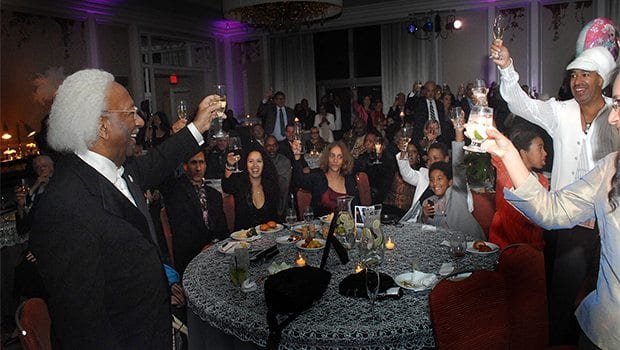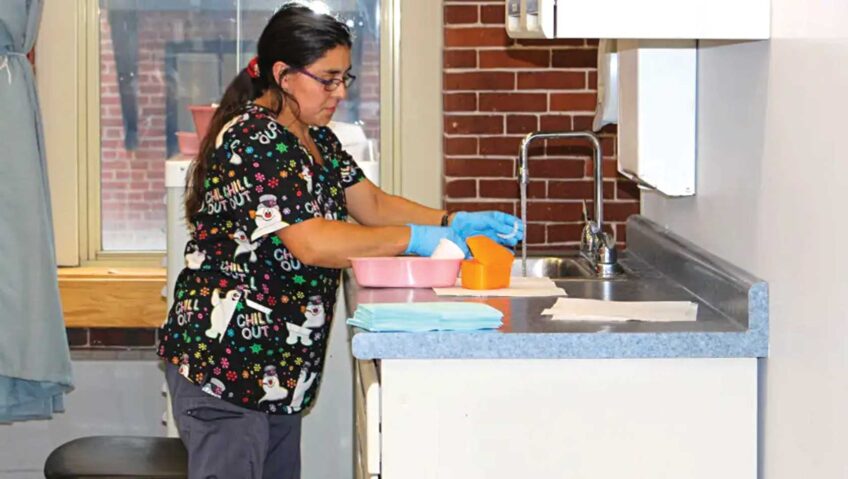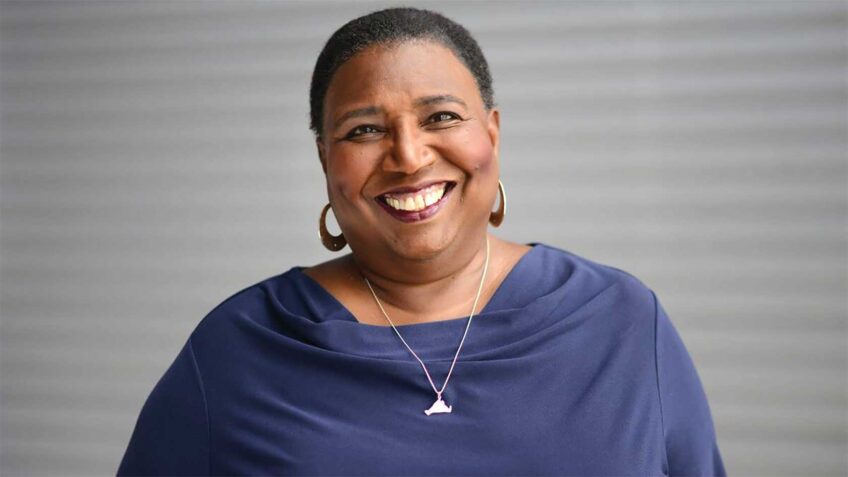Marvin Gilmore celebrates 90th birthday with 200 friends, family members, supporters


Author: Don WestKen Reeves presents key and proclamation to Marvin Gilmore.
Marvin Gilmore, World War II veteran, African American business trailblazer and longtime leader of the nonprofit Community Development Corporation of Boston, celebrated his 90th birthday in high style Monday night with 200 of his friends, family members, colleagues and admirers.
Held at the Hyatt Regency in downtown Boston, the party featured a lavish spread of food, musical performances by David and Marque Gilmore and Grammy-Award winner Gregory Porter, and spoken tributes to Gilmore’s lifetime achievements and personal qualities.
“Mr. Gilmore can best be described as a renaissance man,” said University of Massachusetts Chancellor J. Keith Motley, who led off the tributes. “He’s been a heroic soldier, a musician, a banker, an entrepreneur, a nightclub owner and operator. He’s one of those who can simply not be classified as any one type.”
Jackie Jenkins-Scott, president of Wheelock College and former president and CEO of Roxbury’s Dimock Community Health Center, said Gilmore epitomizes the “servant leader.”
“Those of you here representing organizations Marvin has been involved with, you know he never misses a meeting,” she said. “He never fails to support whatever event you are holding. He never fails to remember how important the work is that we all do.” She cited his commitment to health care, housing, jobs and veterans services.
Turning to Gilmore, seated at a table with his children and grandchildren, Jenkins-Scott said, “I just want you to know, there are thousands and thousands of unnamed people who have benefited because you have walked the walk and delivered and cared deeply about what happens in our community.”
New England Conservatory President Tony Woodcock thanked Gilmore for his mentorship of the college’s music students, including accompanying youth ensembles on trips to Venezuela and Argentina. (Gilmore is a great Tango dancer, Woodcock reports.)
Brandeis University President Frederick Lawrence spoke of Gilmore’s contributions as both a philanthropist/benefactor and a crucial role model to students in the school’s Transition Year Program, founded in the aftermath of the 1968 assassination of Martin Luther King Jr. to help students arriving from “tough backgrounds” to thrive in the college environment.
For the champagne toast, Lawrence sparked applause with a Yiddish phrase meaning “To a hundred-and-twenty.”
No brief tribute easily contains all the roles Gilmore has played over the years, though organizations honoring Gilmore have tried to condense the enormous list.
The Massachusetts Cultural Council, in naming him a 2013 Leadership awardee, described Gilmore as a “humanitarian, entrepreneur, political advisor, honored World War II veteran, musician, and family man, to name just a few of the many incarnations for which he is known.” Project A.B.L.E. honored Gilmore last spring at its Starfish Thrower awards gala, calling him a “philanthropist, entrepreneur, visionary, musician and war hero.”
As President and CEO of the Community Development Corporation of Boston since 1973, Gilmore has played a role in changing the face and economic prospects of Roxbury with projects such as the Southwest Corridor redevelopment, the NewMarket industrial district and the Crosstown Industrial Park development. The birthday party doubled as a fundraiser for the Community Development Corporation, with Gilmore himself unveiling a $100,000 donation.
In 1968, Gilmore was a co-founder of Unity Bank and Trust Company in Roxbury, the first African American owned commercial bank in Boston.
A musician as well, Gilmore trained at the Royal Scottish Academy of Music and New England Conservatory, on whose board he still serves. For 46 years, his nightclub, The Western Front, brought live jazz, reggae and R&B acts to Cambridge’s Riverside neighborhood.
Adding icing to the cake, he made the Boston Globe’s list of the “25 most stylish Bostonians” in 2007, at age 83, for his well-known elegance and fashion flair.
But long before all this, a teenaged Gilmore enlisted in the U.S. Army and embarked for Europe to fight in World War II. He was part of the storming of the Normandy coast on D-Day, June 6, 1944, providing cover from an antiaircraft unit for American soldiers at Utah and Omaha Beaches.
Earlier on the day of his birthday party, Gilmore sat down for an interview with the Banner at his home of 55 years, a stately five-bedroom Victorian house near Porter Square in Cambridge filled with family pictures, awards and other mementos of his life and travels. Amid visiting family members bustling about, and juggling calls and visits from well-wishers, Gilmore shared some reflections on his past and present.
He flipped through a folder of photographs from his June trip to France for observances of the 70th anniversary of the D-Day invasion.
There are pictures of himself with President Obama, with mayors of French cities, soldiers old and young, ordinary citizens and children who thanked him for his service, and with Milène Guermont, a Normandy-born artist who gathered his handprint for a public art installation at Utah Beach.
“I cried, to be honest with you,” he said. “So many soldiers honoring the anniversary, even those not living at the time of the invasion. And mayors came from everywhere to shake my hand, saying ‘thank you for my service.”
But he was not always so properly honored. In the service and upon his return to the U.S., he faced prejudice and discrimination.
“Even after surviving all that, America still separated black troops from white troops,” he said. “The insult.”
In a 2010 Massachusetts State House ceremony, Gilmore was finally awarded the French Legion of Honor for his 1944 role in liberating France.
“Marvin Gilmore’s heroic service in World War II alone is enough to recommend him for the Legion of Honor,” said Christophe Guilhou, consul general of France, as quoted in Boston Globe coverage of the ceremony. “But his bravery and dedication in the face of discrimination make Marvin a true hero.”
On the day of the party, Gilmore was delighted to hold for the first time a copy of a new biography of him. For four years, author Paul Katzeff conducted a series of interviews that culminated in “Marvin Gilmore: Crusader for Freedom,” just published by BookLocker.com. The books had just been delivered that morning.
“This is the bible of how people young and old can be successful,” Gilmore said. “It’s about what it takes to be somebody as a black man.”
He continued, “People give up to early in life. We retire too soon. I’m still working full time, traveling full time, and still enjoying life full time. I’m still driving fast cars.”
At the party, at his turn at the podium, Gilmore attributed his wisdom to his mother and to his grandmother, who was born in slavery.
If there’s an overarching message he wants to convey, as a role model to young people and to everyone, it’s this, he said: “You’re never too old to learn, nor too young to teach.”






